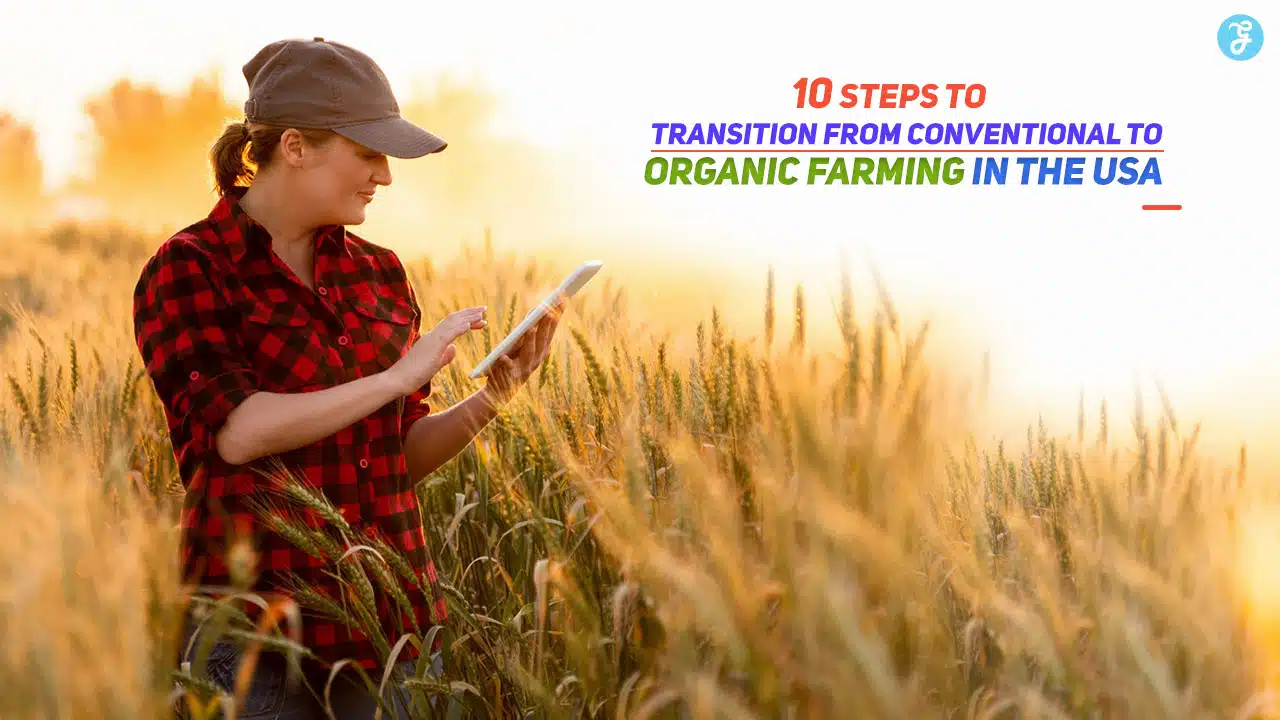As consumer demand for organic products continues to grow, many farmers in the USA are making the transition from conventional farming to organic farming.
Organic agriculture not only offers financial opportunities but also promotes environmental sustainability, improves soil health, and meets the increasing demand for chemical-free produce.
However, transitioning to organic farming is not an overnight process. It requires a well-thought-out plan, adherence to stringent regulations, and a commitment to long-term sustainability.
This guide outlines the 10 critical steps to help farmers transition successfully from conventional to organic farming.
1. Understand Organic Certification Requirements
Why It’s Important
In the USA, organic farming is regulated by the USDA National Organic Program (NOP). Understanding the requirements ensures that your practices align with organic standards and avoid setbacks during certification.
Key Actions
- Review the USDA’s National Organic Standards.
- Familiarize yourself with prohibited substances, including synthetic pesticides and fertilizers.
- Learn about record-keeping requirements for organic certification.
Pro Tip:
Consider attending USDA-certified workshops or consulting with an organic certification agency to gain clarity on compliance requirements.
2. Develop a Transition Plan
Why It’s Important
Switching to organic farming requires significant changes to your operations. A detailed plan helps you navigate this complex process.
Key Actions
- Conduct a soil health assessment to understand your starting point.
- Set short- and long-term goals for your transition.
- Allocate resources for labor, equipment, and inputs that meet organic standards.
Pro Tip:
Document your progress and adjust your plan based on findings during the transition period.
3. Begin the 3-Year Transition Period
Why It’s Important
To qualify for USDA organic certification, your land must be free of prohibited substances for at least three years before the first organic harvest.
Key Actions
- Stop using synthetic chemicals immediately.
- Implement approved organic inputs to support crop health.
- Transition portions of your land incrementally to manage risk and learn organically compliant practices.
Pro Tip:
Use this time to build soil fertility and improve biodiversity, which will benefit your organic crops.
4. Improve Soil Health and Fertility
Why It’s Important
Healthy soil is the foundation of organic farming. Transitioning requires a shift from synthetic fertilizers to natural methods of enhancing soil fertility.
Key Actions
- Use cover crops like clover or rye to fix nitrogen and prevent erosion.
- Incorporate compost, animal manure, and organic matter to enrich the soil.
- Rotate crops to maintain soil nutrients and disrupt pest cycles.
Pro Tip:
Test your soil regularly to monitor nutrient levels and adjust your practices accordingly.
5. Implement Integrated Pest Management (IPM)
Why It’s Important
Organic farming prohibits synthetic pesticides, requiring alternative pest control strategies.
Key Actions
- Introduce natural predators, such as ladybugs, to control harmful pests.
- Use physical barriers like row covers to protect crops.
- Apply organic-approved pest control products as a last resort.
Pro Tip:
Diversify your crops to reduce pest populations and create a balanced ecosystem.
6. Transition Livestock Management Practices
Why It’s Important
If you raise livestock, their management must also comply with organic standards, which emphasize animal welfare and natural feeding practices.
Key Actions
- Feed livestock 100% organic feed and access to certified organic pasture.
- Eliminate the use of antibiotics and growth hormones.
- Provide sufficient outdoor access and clean living conditions.
Pro Tip:
Work with a veterinarian experienced in organic livestock care to ensure animal health.
7. Maintain Detailed Records
Why It’s Important
Record-keeping is a critical component of organic certification. Documentation demonstrates compliance and helps you track your farm’s progress.
Key Actions
- Keep records of all inputs, including seeds, fertilizers, and pest control products.
- Document crop rotation schedules and harvest yields.
- Maintain receipts and records for organic feed and livestock management.
Pro Tip:
Use farm management software to streamline record-keeping and stay organized.
8. Develop a Marketing Plan for Organic Products
Why It’s Important
Transitioning to organic farming often comes with higher production costs, so securing premium prices for your products is essential for profitability.
Key Actions
- Research local and national markets for organic products.
- Build relationships with distributors, retailers, and farmers’ markets that cater to organic consumers.
- Leverage certifications and organic labeling to differentiate your products.
Pro Tip:
Share your farm’s story and commitment to sustainability to connect with consumers and build brand loyalty.
9. Seek Financial Assistance and Grants
Why It’s Important
Transitioning to organic farming can be costly, but financial assistance is available to support farmers during this period.
Key Actions
- Apply for cost-sharing programs through the USDA Organic Certification Cost Share Program.
- Explore federal grants, such as the Environmental Quality Incentives Program (EQIP).
- Look for state-specific funding opportunities for sustainable agriculture.
Pro Tip:
Partner with local agricultural extension offices to identify and apply for financial assistance.
10. Complete Organic Certification
Why It’s Important
Achieving USDA organic certification is the final step in transitioning, allowing you to market your products as organic and access premium pricing.
Key Actions
- Choose a USDA-accredited certifying agent.
- Submit your Organic System Plan (OSP), detailing your farming practices.
- Prepare for and pass an on-site inspection by the certifying agency.
Pro Tip:
Stay updated on organic certification renewals and continue adhering to organic standards to maintain certification.
Conclusion
Transitioning from conventional to organic farming in the USA is a rewarding journey that requires careful planning, dedication, and adherence to strict standards.
By following these 10 steps, farmers can not only achieve USDA organic certification but also contribute to a healthier environment, meet growing consumer demand, and enjoy long-term profitability.
Key Takeaways:
- Start early and develop a comprehensive plan to guide your transition.
- Focus on soil health, pest management, and compliance with USDA standards.
- Leverage financial assistance programs and build a strong market presence for your organic products.
Embark on your journey toward sustainable agriculture today and reap the rewards of organic farming in the years to come!









































